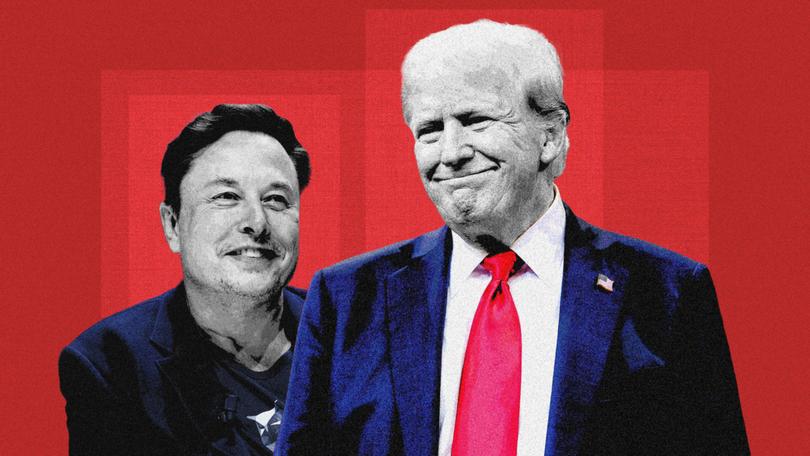THE NEW YORK TIMES: Donald Trump, Elon Musk and an American masculinity crisis

Elon Musk has put full force of his billions, his ownership of the social platform X and himself on the line for Donald Trump, especially in Pennsylvania.
Some of what he has promised to do, such as a $1 million giveaway, may well be illegal.
Other out-out-the ordinary actions — appearing onstage at Trump rallies or blasting false claims about election integrity — have involved aggressively breaking long-standing norms.
Sign up to The Nightly's newsletters.
Get the first look at the digital newspaper, curated daily stories and breaking headlines delivered to your inbox.
By continuing you agree to our Terms and Privacy Policy.By blatantly upending practices (or even laws) and seemingly getting away with it, Musk also appeals to a constituency that both parties are trying to win: young men. Musk’s companies look like the boy-toy aisle in a store organized according to traditional gender roles. And both Musk and Trump frequently float coded ideas about their version of a male-dominated society in their public comments.
All this may help explain why Musk and Trump have aligned their brands. Musk gets a big platform for his version of masculinity and the possibility that Trump will put him in charge of parts of the government and provide favours to his businesses.
Trump gets someone who could gin up turnout among the young male voters he needs to balance the widespread revulsion he has engendered among women.
Each man is taking advantage of an emergent crisis of masculinity in American society in order to gain greater power.
With the rise of feminism and the fall of one version of a male-dominated society with traditional lines of authority and industrial jobs, many men now lack the classic masculine roles they once might have filled. Historically, authoritarian (and, yes, fascist) movements have projected a sort of über-masculinity that’s unrestrained by rules and promised to usher in a world in which their will would triumph through force and dominance.
A modern-day masculinity crisis makes room for this kind of thinking to take root in the United States.
This is why more men should speak up loudly for a positive, empowering vision of masculinity that doesn’t come at the expense of women and doesn’t prize “getting away with” breaking rules.
And the rest of us must recognize that a masculinity crisis exists, rather than dismissing it — as many do on social media — as merely the last cry of those who have lost special privileges.
Young men, in particular, have grown up in a world of feminism and deindustrialization, and they certainly face distinct challenges as they find their way in an unsettled world.
Around them are a gaggle of podcasters, YouTube video producers, Twitch streamers and organizers of political rallies who assert that men have been shafted and claim that they should wrest back control over society by any means available, including force.
It’s not hard to see why this combination may seem attractive to many young men, especially when Trumpian appeal is matched with Musk’s money, boy toys and an implied promise that if you’re a man like them, you too can dominate and get away with it.
But there are other ways to be strong and decent young men, and it’s essential to build and model that alternative, positive vision.
The stakes are high in this election, and they will only continue to grow after Tuesday.
This article originally appeared in The New York Times.
© 2024 The New York Times Company
Originally published on The New York Times
